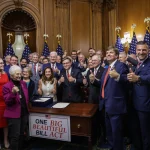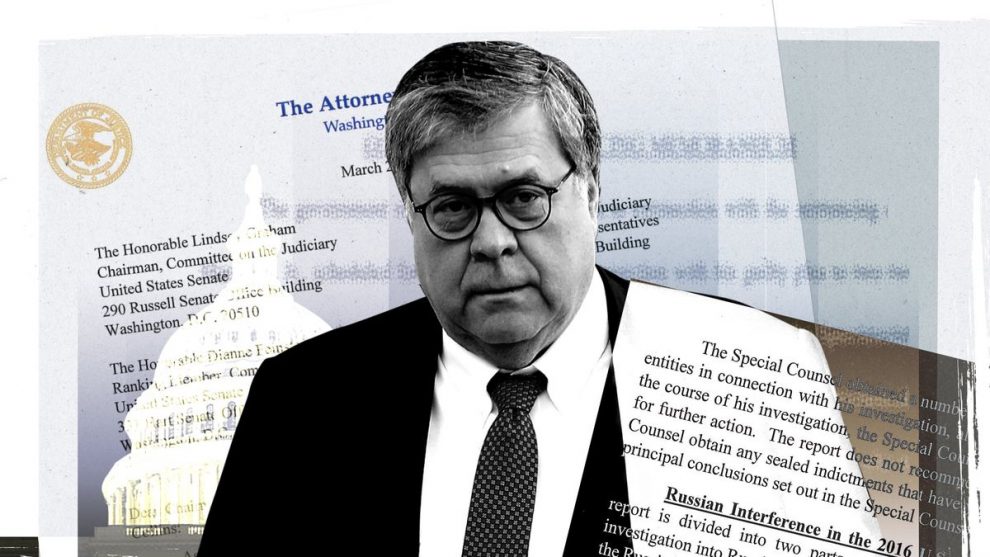America has a crime problem: We treat criminal laws as if they were terms of service on a website — blindly agreeing and praying we’ll never need to know what they say. But it isn’t ordinary Americans who do the clicking; Congress clicks for us.
Worse, most legislators are as blind to what’s inside the laws they enact, or how to enforce them, as your average iTunes user clicking “Yes” on the latest Apple user agreement.
Consider a crime we keep hearing about — obstruction of justice. During his confirmation hearings, Attorney General William Barr sparred with senators about the meaning of the word “corruptly” as it’s used in the obstruction statutes.
Trump administration scores win as Supreme Court approves deportations to third countries
Supreme Court backs Trump bid to deport criminals to South Sudan
Scoop: Ramaswamy pledges to spend at least $30M of his money in Ohio’s race for governor
US Teen Detained After Landing Plane in Antarctica, Accused of Violating ‘Multiple National and International Regulations’
Hakeem Jeffries Breaks House Record, Still Fails to Stop ‘Big Beautiful Bill’
Independence Day blitz: How Trump and the GOP trifecta sealed a major legislative victory
Judge warns DOJ over public comments in Abrego Garcia case
Multiple Missing, Hundreds Affected After Fireworks Factory Explodes: Video
EPA places numerous employees on leave for alleged misuse of official titles in unauthorized letter
Southernmost US City Terminates ICE Agreement, GOP Leadership Fires Back
2 lone Republicans vote against Trump’s ‘big, beautiful bill’ as it heads to president’s desk
Biden claims European leaders begging him ‘to get engaged’
$20M worth of cocaine, marijuana intercepted by Coast Guard
Fox News ‘Antisemitism Exposed’ Newsletter: From chanting hate to whining for pity
Trump DHS Discovers the Biden Admin Handed Migrant Kids Over to the Worst Sponsors Imaginable
It was just one word, concerning one kind of crime, and yet there was sharp disagreement between the people writing laws and the man who would soon be enforcing them. Special counsel Robert Mueller spent 182 pages analyzing the president’s conduct under those same statutes, only to leave the ultimate question unresolved. When Barr returned for Senate Judiciary Committee hearings, Sen. Dianne Feinstein seemed flummoxed when he explained that instructing someone to lie isn’t necessarily a crime.
For answers, many have turned to the cavalcade of legal analysts on cable news declaring assuredly that the president definitely had, or definitely hadn’t, committed obstruction. Those watching at home had to wonder: Shouldn’t there be an actual answer? Isn’t everyone looking at the same law? Surely America’s most telegenic legal minds and seasoned government officials can definitively answer the binary question of whether the president obstructed justice. But they haven’t. Now some are calling on Congress to answer it in impeachment proceedings.
This tiresome exercise could be undertaken with countless other federal laws. Is it a crime to remove a migratory bird that has taken up roost in your house? It depends. Can you cut the tag off a mattress? Again, it depends. What does it depend on? Well, that depends too. Lawyers are conditioned to accept this, but it’s no less unsettling that, even when the facts are clear, lawmakers, law enforcers, judges and lawyers still can’t agree on what the law itself makes a crime.
Trump administration scores win as Supreme Court approves deportations to third countries
Supreme Court backs Trump bid to deport criminals to South Sudan
Scoop: Ramaswamy pledges to spend at least $30M of his money in Ohio’s race for governor
US Teen Detained After Landing Plane in Antarctica, Accused of Violating ‘Multiple National and International Regulations’
Hakeem Jeffries Breaks House Record, Still Fails to Stop ‘Big Beautiful Bill’
Independence Day blitz: How Trump and the GOP trifecta sealed a major legislative victory
Judge warns DOJ over public comments in Abrego Garcia case
Multiple Missing, Hundreds Affected After Fireworks Factory Explodes: Video
EPA places numerous employees on leave for alleged misuse of official titles in unauthorized letter
Southernmost US City Terminates ICE Agreement, GOP Leadership Fires Back
2 lone Republicans vote against Trump’s ‘big, beautiful bill’ as it heads to president’s desk
Biden claims European leaders begging him ‘to get engaged’
$20M worth of cocaine, marijuana intercepted by Coast Guard
Fox News ‘Antisemitism Exposed’ Newsletter: From chanting hate to whining for pity
Trump DHS Discovers the Biden Admin Handed Migrant Kids Over to the Worst Sponsors Imaginable
It’s not just a federal problem. Nor is it an exclusively political one. The same day that the special counsel released his report, the highest court in the state of Washington issued an evenly split opinion concerning that state’s own obstruction statute. In it, eight justices of the Washington Supreme Court couldn’t agree whether a man’s refusal to open his door for police constituted a crime. There was no real dispute about the facts. There was a statute written in black and white. Yet the court split 4-4.
This kind of ambiguity is a problem for an executive branch charged with enforcing laws and a judiciary that applies them. It may soon become a very public problem for a Congress trying its hand at both. Mostly, however, it threatens all of us who are presumed to know the law, required to comply with it and barred from arguing ignorance of the law as an excuse.
If Congress really is about to embark on impeachment, perhaps lawmakers will learn a valuable lesson in the process. Let them slog through the muck of their own criminal statutes. Let them display how even they can’t agree on what the text of the law means. Then let America be reminded that we had better follow the untold thousands of laws written by these people or go to prison.
Trump administration scores win as Supreme Court approves deportations to third countries
Supreme Court backs Trump bid to deport criminals to South Sudan
Scoop: Ramaswamy pledges to spend at least $30M of his money in Ohio’s race for governor
US Teen Detained After Landing Plane in Antarctica, Accused of Violating ‘Multiple National and International Regulations’
Hakeem Jeffries Breaks House Record, Still Fails to Stop ‘Big Beautiful Bill’
Independence Day blitz: How Trump and the GOP trifecta sealed a major legislative victory
Judge warns DOJ over public comments in Abrego Garcia case
Multiple Missing, Hundreds Affected After Fireworks Factory Explodes: Video
EPA places numerous employees on leave for alleged misuse of official titles in unauthorized letter
Southernmost US City Terminates ICE Agreement, GOP Leadership Fires Back
2 lone Republicans vote against Trump’s ‘big, beautiful bill’ as it heads to president’s desk
Biden claims European leaders begging him ‘to get engaged’
$20M worth of cocaine, marijuana intercepted by Coast Guard
Fox News ‘Antisemitism Exposed’ Newsletter: From chanting hate to whining for pity
Trump DHS Discovers the Biden Admin Handed Migrant Kids Over to the Worst Sponsors Imaginable
Impeachment or not, the problem is already on display. We spent two years and tens of millions of dollars on an investigation conducted by dozens of lawyers, all for a non-answer on whether one person committed a particular crime. Meanwhile, hundreds of millions of us could have violated any of the thousands of criminal laws on the books, and we would be hard-pressed to afford just one lawyer to defend us.
To be sure, criminal conduct is nuanced, and it’s impossible to write a perfect statute. But we shouldn’t ignore the danger in a system where lawmakers, the nation’s top prosecutor or a court of last resort can’t agree on whether something is a crime. Hopefully, lawmakers will soon spend less time politicking and more time making the law clearer.
Story cited here.
























